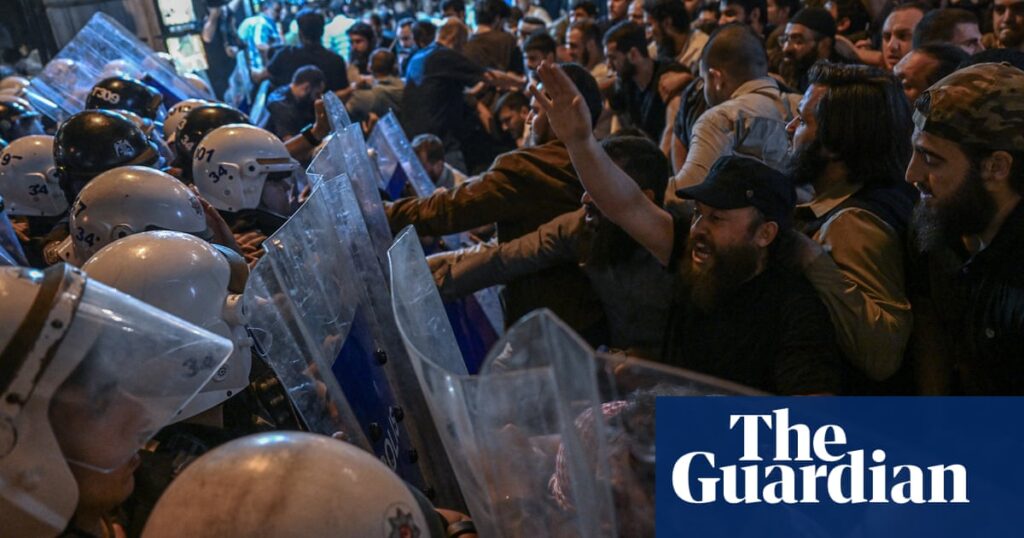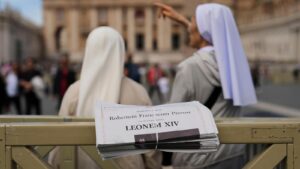
Clashes broke out in Istanbul on Monday as police resorted to using rubber bullets and teargas to disperse a crowd after accusations surfaced that a satirical magazine, LeMan, had published a cartoon allegedly depicting the prophet Muhammad. The unrest followed an order from Istanbul’s chief prosecutor to arrest the magazine’s editors, claiming the cartoon “publicly insulted religious values.”
The editor-in-chief of LeMan, Tuncay Akgun, countered the allegations, asserting that the image had been misinterpreted. “This cartoon is not a caricature of prophet Muhammad in any way,” Akgun told Agence France-Presse. He explained, “In this work, the name of a Muslim who was killed in the bombardments of Israel is fictionalised as Muhammad. More than 200 million people in the Islamic world are named Muhammad. It has nothing to do with prophet Muhammad. We would never take such a risk.”
As the situation unfolded, tensions escalated when several dozen protesters targeted a bar frequented by LeMan staff in downtown Istanbul, leading to confrontations with police. According to an AFP correspondent, these scuffles quickly intensified, involving between 250 to 300 people.
Background and Context
Founded in 1991, LeMan is renowned for its political satire, often challenging conservative perspectives. The magazine gained notoriety for its support of France’s Charlie Hebdo after the 2015 attack on its Paris offices by Islamist gunmen, which was prompted by the publication of caricatures of the prophet Muhammad.
The interior minister, Ali Yerlikaya, confirmed on X that the cartoonist responsible for the image, along with LeMan’s graphic designer, had been detained. “The person named DP who made this vile drawing has been caught and taken into custody,” he stated, emphasizing, “These shameless individuals will be held accountable before the law.” Additional arrests included LeMan’s editor-in-chief and managing editor, as reported by local media.
Official Responses and Public Reaction
In a series of posts on X, LeMan defended the cartoon, arguing that it had been deliberately misinterpreted to incite provocation. “The cartoonist wanted to portray the righteousness of the oppressed Muslim people by depicting a Muslim killed by Israel; he never intended to belittle religious values,” the magazine asserted. “We do not accept the stigma imposed on us because there is no depiction of our prophet. It takes a very malicious person to interpret the cartoon in this way.” They also issued an apology to their readers who might have been misled by the controversy.
Justice Minister Yilmaz Tunc announced the initiation of an investigation on the grounds of “publicly insulting religious values.” He stated, “Disrespect towards our beliefs is never acceptable. No freedom grants the right to make the sacred values of a belief the subject of ugly humour. The caricature or any form of visual representation of our prophet not only harms our religious values but also damages societal peace.”
Istanbul’s governor, Davut Gul, also condemned the actions, criticizing “this mentality that seeks to provoke society by attacking our sacred values.” He affirmed, “We will not remain silent in the face of any vile act targeting our nation’s faith.”
Implications and Future Outlook
This incident highlights the ongoing tension between freedom of expression and religious sensitivities in Turkey, a predominantly Muslim country with a history of strict laws against insulting religious values. The situation underscores the delicate balance that must be maintained between upholding free speech and respecting religious beliefs.
As the investigation progresses, the international community will be watching closely, particularly given Turkey’s strategic position and its role in regional geopolitics. The outcome could have significant implications for media freedom in the country and might influence how similar cases are handled in the future.
The broader implications of this incident may also affect Turkey’s relationship with other nations, especially those with vested interests in issues of press freedom and human rights. Observers will be keen to see whether this case prompts any policy changes or leads to further societal debates on the limits of satire and expression.
As the dust settles, the focus will likely shift to how the Turkish government navigates these complex issues, balancing domestic pressures with international expectations. The coming weeks will be crucial in determining the long-term impact of this controversy on Turkey’s media landscape and its broader societal values.





